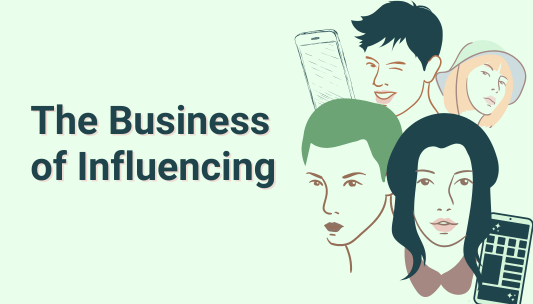**NOTE: New guidance on social media advertising for influencers launched was launched on 27 October 2023. You can read the guidance here.**
Over half (51%) of people in Ireland say they are concerned by a lack of transparency in influencer marketing according to research conducted by the Advertising Standards Authority for Ireland
- Nearly 3 in 4 (73%) are familiar with the practice of influencer marketing
- 59% consider influencers who do not seem authentic to be ‘annoying’ while 57% get ‘annoyed’ at seeing too much sponsored content
- Over 40% believe influencers to be more responsible with advertising today compared to three years ago
23rd February 2021
Just over half (51%) of people in Ireland say they are concerned by a lack of transparency in influencer marketing, according to recent research from the Advertising Standards Authority for Ireland (ASAI), the independent, self-regulatory body committed to promoting the highest standards of marketing communications in Ireland.
The research looks at the influencer industry in Ireland and reveals the impact on consumer behaviour and attitudes. The survey results are based on the views of 1,224 participants across a broad demographic, interviewed online and representative of the adult population.
Nearly 3 in 4 people (73%) are familiar with the practice of influencer marketing, with a majority (80%) believing that when an influencer posts an ad, they are being paid by the brand to post positive content and that any mentions of a brand in a post means it is advertising (75%).
The research found that while 76% have used social media for tips and inspiration, 57% find too much sponsored content ‘annoying’. Similarly, the majority of Irish adults (59%) find over edited photos ‘annoying’ as well as influencers who do not seem authentic or misrepresent real life (59%).
Additional bugbears include content that takes advantage of impressionable audiences (52%) and repetitive posts (49%). However, 42% believe influencers to be more responsible with advertising that they were three years ago.
The research also provides insight into the efficacy of online advertising, with two thirds (66%) of social media users able to spontaneously recall hashtags or phrases such as #ad, #sponsored or #brandambassador used to identify advertising content.
The ASAI has strict guidelines around how influencer content should be flagged having introduced guidance on the ‘Recognisability of Marketing Communications’ – covering commercial content created on behalf of brands as well as commercial content created by influencers for their own products and services.
Commenting on the research, Orla Twomey, Chief Executive of the ASAI, said: “Over the last number of years influencers have cemented their place in the digital advertising space and this is set to increase further this year and beyond. However, with power lies great responsibility as consumers are demanding more from the influencers they follow and trust. The report findings prove that if influencer marketing is to sustain and deliver desired ROI, trust and transparency needs to be established every step of the way, from influencer selection right through to campaign delivery.
“Although there has been vast improvement in recent years, influencers and brands alike will need to step up and build more authentic campaigns that resonate with the consumer as doing so will provide a more meaningful experience for all involved.”
To coincide with the second wave of research results, the ASAI today hosted a webinar called ‘#InfluencerMarketing in 2021 and beyond – retaining trust through transparency’
. Those who took part were:
- Louise McSharry, RTE 2FM presenter, who moderated the discussion
- Darren Kennedy, TV Presenter and Entrepreneur, discussed his experience as an influencer in Ireland
- Dael Wood, Dentsu, gave an overview of the research results
- Orla Twomey, CEO of the ASAI, discussed the organisation’s ongoing work in the influencer marketing space and its updated Guidance Note on influencers
- Scott Guthrie, UK based Influencer Marketing Advisor, discussed the evolution and future of influencer marketing in his marketplace
- Hayley Browning, Corporate Communications Manager with The Competition and Consumer Protection Commission (CCPC) provided an overview on consumer protection laws and misleading information
To find out more information about the webinar or to watch it back, please contact clodaghfoley@uniquemedia.ie
The Advertising Standards Authority for Ireland is financed by the advertising industry and committed, in the public interest, to promoting the highest standards of marketing communications that is advertising, promotional marketing and direct marketing. The objective is to ensure that all commercial marketing communications are ‘legal, decent, honest and truthful’.
The Code covers commercial marketing communications and sales promotions in all media in Ireland including digital (online banners, websites and social platforms), print, outdoor, radio, TV, leaflets/brochures, and direct marketing. Advertising in breach of the Code must be withdrawn or amended.
Methodology:
The research was carried out by Amárach Research. Fieldwork took place from 21st – 23rd October 2020 with a sample of 1,224 participants.
Further information on advertising self-regulation, the ASAI and the operation
of the system is available at www.asai.ie
Follow the ASAI on Twitter @THE_ASAI
For further details, please contact:
Breda Brown
Unique Media
Tel: (01) 522 5200 or (085) 865 8019 (CF)
